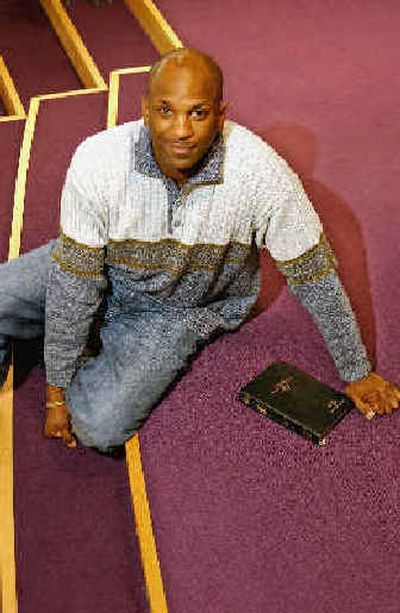All about praising Jesus

Few gospel acts are as welcome in the secular music world as Donnie McClurkin.
At last year’s glitzy BET Awards, the nominees included Usher, Beyonce … and McClurkin.
At the annual Essence Music Festival, performing on a bill that featured Prince, Mary J. Blige and LL Cool J was … McClurkin.
And though gospel rarely gets airplay outside of Sunday mornings, one of the few to break through – with hits like “Again” or “We Fall Down” – has been Donnie McClurkin.
So the secular world may be disappointed to learn that it’s not a mutual admiration society.
“There’s some great talent,” McClurkin muses when asked what nongospel music he prefers. “But the real talent is in the church.”
However, as a reverend, McClurkin knows many of the real people he’s trying to reach are not in church. So he’s more than willing to perform in venues that are not normally hospitable to religious acts.
“You’re singing to people who are not necessarily churchgoers,” he says. “And we have 45 minutes of nothing but gospel. Not the watered-down, user-friendly gospel – the hard core. … We don’t dumb it down.”
Where other Christian acts may avoid overtly religious lyrics to appeal to a wider audience, McClurkin’s music is all about praising Jesus.
His latest album, “Psalms, Hymns & Spiritual Songs,” released earlier this month, is among the most powerful in his nine-year, multiplatinum career, as he revisits traditional hymns and church favorites.
He says the younger generation sorely needs it.
“They need to know our heritage. Because we’ve got young kids that are growing up knowing ‘Stomp,’ and ‘We Fall Down,’ ” he says of his contemporary hits. “But they don’t know our history, so that’s what we’re doing, bringing those songs back.”
While McClurkin, 45, is a fan of contemporary gospel, he’s not an admirer of much of today’s music. Even the mention of Kanye West’s “Jesus Walks,” the rap hit that drew some praise for mentioning religion, sparks a lecture about what should be taught to children.
“What happened with that is they downplayed it, dumbed (Jesus) down, to be the good fairy that looks after you and condones your mess and protects you in the melee,” he scoffs. “That is not who he is or ever was or ever will be.”
But while McClurkin may be adamant about what’s moral, he’s just as forceful in his view that sinners can be saved. One of his biggest hits, “We Fall Down,” is all about redemption – and he is quick to point out that he is prime example.
In his 2001 book, “Eternal Victim/Eternal Victor,” and in last fall’s DVD documentary, “The Donnie McClurkin Story: From Darkness to Light,” he revealed a childhood of sexual abuse, struggles with homosexuality and bisexuality, and personal battles against illness (he once had leukemia) and other tragedies.
McClurkin says revisiting his demons in the book and DVD was painful.
“But through the trauma it also gave closure and resolution to a lot of things, and I was able to deal with a lot of taboo issues, like sexuality and my struggle with bisexuality and how God helped me find myself, find who I really am,” he says.
Gay-rights activists have been chagrined to hear how McClurkin describes himself today – as a man cured of homosexuality.
“They have to vilify the one that’s saying there is hope, there is help, there’s an out,” he says. “What I say in the book is simply this: If you’re gay, and you’re happy, if you don’t think you need to change, stay just how you are.
“But there are some people who are in the gay and bisexual lifestyle that are broken; that’s why the suicide rate is so high.”
At the same time, McClurkin is critical of church leaders who demonize homosexuals from the pulpit.
“You’ve got the church people who are lambasting and so demeaningly preaching hard against the person and not the sin,” he says. “You’ve got the preachers calling them names. We become harsh and we haven’t portrayed the love of Jesus Christ.”